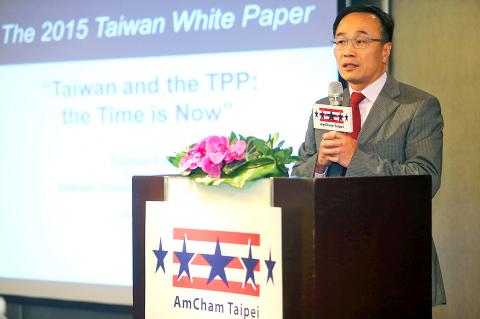The American Chamber of Commerce (AmCham) in Taipei yesterday called on the government to adopt a more effective approach to join the Trans-Pacific Partnership (TPP) by forming a task force to accelerate progress.
The group’s call came after the nation’s efforts to become a candidate for second-round entry have remained in limbo over the past year.
As the 12-member trade bloc is likely to be formed next year, Taiwan needs to take decisive action to establish its credibility for trade liberalization, AmCham said.

Photo: CNA
“We are really worried that Taiwan will be marginalized [economically] as the world is moving forwards,” AmCham chairman Thomas Fann (范炘) told a press conference as the group issued its annual White Paper, adding that the China-South Korea free-trade agreement took effect this week, while the US is in talks with the EU over the Transatlantic Trade and Investment Partnership.
“Participating in a big trade organization will be a good way [to avoid such a risk],” Fann said.
The TPP represents a huge market, as the 12 economies involved produce more than 40 percent of global GDP, he said.
Joining the trade bloc would also help Taiwan reduce its reliance on China and rebalance its trade long term, he added.
In the White Paper, AmCham suggested that the Executive Yuan could create a TPP task force to ensure that the individual ministries and agencies carry out the necessary reforms.
The task force should oversee communications with the public and the legislature to build a sense of national mission behind TPP accession, it said.
Fann said the government should tap a high-ranking government official to lead the task force.
A political heavyweight with national recognition, such as former vice president Vincent Siew (蕭萬長), would be an ideal candidate, he said.
AmCham also warned that no invitations would be issued to join the TPP as some government agencies and private think tanks seem to imagine.
“Would-be candidates must apply,” the business group said in the White Paper.
Of the 12 members of the TPP, Taiwan has signed free-trade agreements with just New Zealand and Singapore, Fann said.
Taiwan needs to accelerate its efforts to become qualified by holding talks with those countries to solve existing, or potential, trade disputes, he said.
“Joining the TPP would make Taiwan a springboard for foreign companies to enter the trade bloc,” Fann said.
In response, the National Development Council said that as the government already has an international trade and economic task force, it would not consider forming another one.
The task force is convened by Vice Premier Simon Chang (張善政) every two to three months.
It requires ministries to report the latest progress on efforts to join the TPP, the council said.
The council said the government would continue deepening structural reforms and improve the business-related legal system in a bid to create a better environment for joining regional economic pacts.
“We hope the American Chamber of Commerce in Taipei continues to voice its support for Taiwan participating in the TPP second-round negotiations,” the council said.
Additional reporting by Lauly Li

MAKING WAVES: China’s maritime militia could become a nontraditional threat in war, clogging up shipping lanes to prevent US or Japanese intervention, a report said About 1,900 Chinese ships flying flags of convenience and fishing vessels that participated in China’s military exercises around Taiwan last month and in January last year have been listed for monitoring, Coast Guard Administration (CGA) Deputy Director-General Hsieh Ching-chin (謝慶欽) said yesterday. Following amendments to the Commercial Port Act (商港法) and the Law of Ships (船舶法) last month, the CGA can designate possible berthing areas or deny ports of call for vessels suspected of loitering around areas where undersea cables can be accessed, Oceans Affairs Council Minister Kuan Bi-ling (管碧玲) said. The list of suspected ships, originally 300, had risen to about

DAREDEVIL: Honnold said it had always been a dream of his to climb Taipei 101, while a Netflix producer said the skyscraper was ‘a real icon of this country’ US climber Alex Honnold yesterday took on Taiwan’s tallest building, becoming the first person to scale Taipei 101 without a rope, harness or safety net. Hundreds of spectators gathered at the base of the 101-story skyscraper to watch Honnold, 40, embark on his daredevil feat, which was also broadcast live on Netflix. Dressed in a red T-shirt and yellow custom-made climbing shoes, Honnold swiftly moved up the southeast face of the glass and steel building. At one point, he stepped onto a platform midway up to wave down at fans and onlookers who were taking photos. People watching from inside

Japan’s strategic alliance with the US would collapse if Tokyo were to turn away from a conflict in Taiwan, Japanese Prime Minister Sanae Takaichi said yesterday, but distanced herself from previous comments that suggested a possible military response in such an event. Takaichi expressed her latest views on a nationally broadcast TV program late on Monday, where an opposition party leader criticized her for igniting tensions with China with the earlier remarks. Ties between Japan and China have sunk to the worst level in years after Takaichi said in November that a hypothetical Chinese attack on Taiwan could bring about a Japanese

STREAMLINED: The dedicated funding would allow the US to transfer equipment to Taiwan when needed and order upgraded replacements for stockpiles, a source said The US House of Representatives on Thursday passed a defense appropriations bill totaling US$838.7 billion, of which US$1 billion is to be allocated to reinforcing security cooperation with Taiwan and US$150 million to replace defense articles provided to the nation. These are part of the Consolidated Appropriation Act, which the US House yesterday passed with 341 votes in favor and 88 against. The act must be passed by the US Senate before Friday next week to avoid another government shutdown. The US House Committee on Appropriations on Monday unveiled the act, saying that it allocates US$1 billion for the Taiwan Security Cooperation Initiative